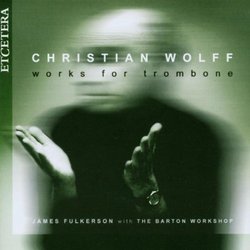Not good synergy, trombone and Wolff's aesthetic
scarecrow | Chicago, Illinois United States | 01/23/2006
(4 out of 5 stars)
"The Trombone,Tenor,Bass or otherwise does not make a good expressive synergy with the unfinished textures and linear non-developments of Wolff's music. Much of the playing here sounds arbitrary predictable,nothing seems to be shaped in melodic direction is even attempted,to give life and impetus to a melodic line; nor is there interesting articulation deployed or use of dynamics even attempted, the primarily melodic lines in and of themselves are quite interesting and simply played without expressive interferance sounds more like a trombonist warming up on doodles,for what? Who knows!.
Wolff's music has always had this paradigm of performing problems as part of its aesthetic,more so than the exquisite lyrical floating Feldman ormore solidly conceived music of Earle Brown or Cage.Wolff's music doesn't seem to turn the corner from the phanthom dimesions of writing it to what is actually played, and this is in fact the most interesting aspect of playing Wolff's music that he allows performative freedoms, that as a composer he cannot think of all the interpretive possibilities. Wolff allows the performer much freedoms seldom giving dynamics of articulations, and tempi are suggested but can be changed at places or sometimes changed ad infinitum. This is an aesthetic largely defined within the Cage philosophic that of merely presenting materials to players, to musiicans to construct a work, and the performative freedoms here has a point of libratory moment about it, But Fulkerson I found did not fill in the object of the performer on the other side of the tracks. In Wolff you simply cannot play the tones and materials as given and expect for it to sound mildly interesting.The performer really needs to think through the entire work. Of course I doubt if anyone still beleives that the Zen canon is at work here that there is no wrong or right way to play this music, well that's self-indulgent to believe that, we have lived through the avant-garde now and we know how to make any points within this repertoire as interesting objects for contemplation and enhancing the listening experience.The pianist Sally Pinkus is an excellent example of what I am saying herein of readings of Wolff's piano "preludes" for example or Ursula Oppens is also very good interpreter of Wolff's piano music, the piece "for the disappeared".
" Ruth" here for piano and trombone(a neglected genre) dedicated to Ruth Crawford Seeger is simply not an interesting piece,20 minutes long the trombone merely sounds arbitrary, and the melodic lines carry no weight of interest, at least not the way they are played here. The trombone has a point of boredom to it when it is utilized as a solo instrument or with accompaniment.You simply cannot write anything. There is too much of the unwanted blah-blah,sloppy slide technique timbre that teachers advise students to avoid. . . Perhaps this is why Wolff's music succeeds the most when a singable knowable tune is engaged within the discourse, as in "Dark as a Dungeon" this is a Kentucky Coal Miner tune and originally written for Solo Bb Clarinet by Wolff. It works quite well in that context, the Clarinet rendering a plaintive, lonesome expressive ambience, like the coal miner's lifeworld, deeply repetitious working the dangerous mines,where your lungs become filled everyday with coal dust,lonely and dull. The addition of the contrabass helps the music along very much the indeterminate unintended coincidences make for more interest than Fulkerson's boring solos.
The "Tuba Song" was written for Tuba Solo but it can have additional tropes juxtaposed with itself. It also has a plaintive gentle melody,very seraching,and again the piece works quite well as a solo. Here the bass trombone and its phanthom pre-recorded "mirror" has interesting possibilities, but Fulkerosn seems to simply let the melodic materials be what they are without much interferance. The odd, muting throughout here and summoning of "dirty" trombone sounds has points of interests, but without a context proclaimed the events are arbitrary.
The borrowed materials from Wolff's "Exercise #17" for a bass trombone solo ( a neglected genre) is a great idea this Bach-like transferring of materials between instrumental concepts. But the results again are questionable.
"For 1,2,or 3 Players" is now an early pre-political classic, largely written in Wolff's quite unique graphic notations where the performer's follow graphics up and down the page,lines with arrows,functions and numbers indicating numbers of tones to be played in real time. Here we have the old avant-garde at work again, and perhaps these players hear haven't heard much of what can be done with this music with more attitude, greater flair and imagination for instrumental timbre of interest, instead we get the same predictable like gesturing, and I know if you are being true to the legitimacy of the musical graphics this in some respects holds you back but still there are approaches that could have made this piece simply more than a reading. You really need to play therse pieces as on-going reperoire to know them,so you can finely tune what works like you are building developing a vocabulary from the piece. That is an interesting part of Wolff's more indeterminate period,that the work becomes like a "working" diary of perfomative readings itself.
"Peggy" for Tenor Trombone I heard two trombones here, and I purchased this for the interest in neglected genre of works for solo trombone, and or solo bass trombone, but again the playing was as above, quite straight uninterestingly.But the Four Stars are for the attempt to perform this difficult music."


 Track Listings (6) - Disc #1
Track Listings (6) - Disc #1